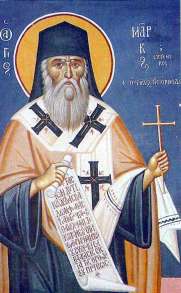All Scripture Is Inspired by God: The case of Apocrypha
15 January 2015
 Joel Kalvesmaki is Editor in Byzantine Studies at Dumbarton Oaks, overseeing the production of Dumbarton Oaks’ flagship Byzantine publications, print and digital. He is active in the digital humanities and his research covers intellectual history in late antiquity, with a focus on ancient number symbolism and the writings of Evagrius Ponticus.
Joel Kalvesmaki is Editor in Byzantine Studies at Dumbarton Oaks, overseeing the production of Dumbarton Oaks’ flagship Byzantine publications, print and digital. He is active in the digital humanities and his research covers intellectual history in late antiquity, with a focus on ancient number symbolism and the writings of Evagrius Ponticus.
***
All Scripture is inspired by God and profitable for teaching, for reproof, for correction, for training in righteousness; that the man of God may be adequate, equipped for every good work.
(II Tim 3:16)
***
What? The Apocrypha inspired? Never! As Evangelicals we have been raised with the understanding that there are only 39 books of the Old Testament, unique and unlike any other. No Christian could seriously believe in the Apocrypha! This attitude is exemplefied by Geisler and Nix, who, in their book From God to Us, give reasons why the Apocrypha cannot be accepted: because…
…of the testimony of Jesus and the New Testament writers
It is true there is no direct quotation in the New Testament of the Apocrypha. But, before smugly moving on, we should recognize that the New Testament alludes to and uses the Apocrypha.
For instance, when the Sadducees came to Jesus to challenge him on the issue of the Resurrection (Mt 22:23-33), they referred to seven brothers among them who, each in turn, married the same woman, dying before having children. This story is neither ludicrous nor an invention. Rather, it is a speculative question probably based on the situation of Sarah in Tobit (Tob 3:7-17). She found herself facing childlessness as seven marriages had resulted in death, each husband dying on the night of their marriage. “In the resurrection therefore, whose wife of the seven shall she be?” asked the Sadducees regarding Sarah’s plight.
Jesus’ parable of the widow and the uncaring judge (Lk 18:1-8) is a variation of a set of proverbs found in the Wisdom of Sirach (Eccl 35:13-15).
St. Paul often alludes to the wisdom and power of God, and his treatment shows a strong affinity with the Book of Wisdom, the theology of which is strongly Christian. One fine example of this is in Romans:
Therefore, just as through one man sin entered into the world, and death through sin, and so death spread to all mean, because all sinned. (Rom 5:12)
St. Paul’s understanding of the Fall does not depend only on Genesis 2-3, which does not explicitly state that sin entered the world because of Adam’s transgression. It can be interpreted this way, but St. Paul’s exegesis depends more on the book of Wisdom:
But by the envy of the devil, death entered the world, and they who are in his possession experience it. (Wis 2:24)
It is true that the authors do not call these books inspired. But what books do the NT authors declare to be inspired? The argument can work the other direction. There are seventeen books the New Testament does not quote, e.g., Joshua, Judges, Ezekiel, Ezra/Nehemiah and Chronicles, to name but a few. Are these then dubious? Using Geisler and Dix’s rule, shouldn’t we exclude these from the canon? The nearest citation to the Chronicles is, with a stretch of details, a reference by Jesus to the killing of a certain Zechariah (Mt 23:35, Lk 11:51). Does an indirect reference like this really establish that the Chronicles are inspired? In fact, the Bible doesn’t specifically call any book inspired. Why should we?
…of the testimony of early Christian synods
The purpose of local synods, before the advent of the ecumenical councils, was to decide regional disputes, not to establish the fundamental doctrines of the faith. Establishing a “canon of Scripture” was never up for discussion. The earliest synods to make a statement about what was in Scripture were in North Africa, around A.D. 400. Even then, though, the statement was made in light of regional problems in North Africa. The rest of the Church did not seem to notice, or have the need of convening a council to declare what was in the “canon.” But even if the had, the Apocryphal books would have certainly received a warm response. Here are excerpts from the acts of two early local synods.
…Holy Scripture meets and warns us, saying….”And fear not the words of a sinful man, for his glory shall be dung and worms. Today he is lifted up, and tomorrow he shall not be found, because he is turned into his earth, and his thought shall perish (I Mac 2:62,63)” Cyprian, Ep. 14, 2nd council of Carthage, AD 252, (ANF V:339)
Quietus of Baruch said: We who live by faith ought to obey with careful observance those things which before have been foretold for our instruction. For it is written in Solomon: “He that is baptized from the dead, (and again toucheth the dead,) what availeth his washing (Ecclus 34:25)?” The 7th council of Carthage, AD 256, (ANF V:568)
…of the testimony of the great Fathers of the early church
Origen, Cyril of Jerusalem, and Athanasius are specifically cited by Geisler and Nix as speaking against the Apocrypha. This is quite an interesting allegation because anyone familiar with the writings of these, and other Church Fathers, will know that precisely the opposite is true.
Origen, in his commentaries on the Gospels of St. John and St. Matthew, cites Judith, Wisdom, Ecclesiasticus, additions to Daniel and Esdras I. Other Fathers before Origen, such as Clement of Rome, Polycarp, Clement of Alexandria, and Irenaeus all quote from the Apocrypha. It is difficult to find a Father who does not quote the Apocrypha and treat it as Scripture.
St. Athanasius, in his festal letter of 367, lists the books of the Old Testament and includes in his canon those parts of the Apocrypha associated with Jeremiah and Daniel (all the while he excludes Esther!). He also commends other books of the Apocrypha as suitable for the instruction of new Christians, although he does not rate them as Scripture. St. Athanasius’s wrote the letter to exclude the apocryphal and spurious gospels of the second century and later, not the writings we know today as the Apocrypha.
…of the testimony of Luther & the Reformers
It is true that the Reformers generally subscribed to the Hebrew canon. And yet even then they were not hostile towards the Apocrypha. Luther included them in his translation of the Bible as being helpful to read. Editions of the King James Version until the 19th century included the Apocrypha. According to the Book of Common Prayer “the [English] Church doth read [the Apocrypha] for example of life and instruction of manners; but yet doth it not apply them to establish any doctrine…” (Art 6). What a long way we have come, where these books, once honored by Protestants, have fallen from to derision!
…of the innovation of the council of Trent
Although the council of Trent was late, it did not mark a change in the canon, but rather reflected what had been used as Scripture for the previous fifteen centuries. Generally, if an issue is not disputed, it doesn’t need to be clarified. Up to then Rome had no need to define her canon. No church in the world, from Armenia to Ethiopia to Rome, had questioned the Apocrypha. Only Protestants, preferring their own wisdom to that of the rest of Christendom, prompted the canon to be defined.
…of the testimony of Philo, Josephus, and the Council of Jamnia
As mentioned before, the testimony, or lack thereof, of these Jewish scholars carried little weight with Christians in the early centuries. Should it be any different for us? Were the sons of the Pharisees spiritually fit to establish the canon? In trying to direct authority to the Jews, Geisler and Nix state:
“Palestine was the home of the Jewish canon, not Alexandria, Egypt. The great Greek learning center in Egypt was no authority in determining which books belonged in the Jewish Old Testament.” (Geisler & Nix, 96)
Certainly Alexandria was not the “home” of the Jewish canon, but this misses the point. Does the Old Testament belong to Jews or Christians? The question for us revolves around, not what was in the Jewish Old Testament, but what was in the Christian one! Who are the competent authorities on this question? If we respect the Jewish decision on the canon, should we then reconsider our position regarding the Messiah, the Sabbath, and the Law? Why should we care what the Pharisees determined?
…of St. Jerome’s testimony
The opinions of one man do not form the mind of the Church. St. Augustine, his contemporary, begged to differ with him, as did previous and later Fathers.
…of the testimony of Reformation-period Roman Catholic scholars
Geisler and Nix cite Cardinals Cajetan and Ximenes as distinguishing the Apocrypha, in an effort to show that Rome was divided on the subject. This may result from our long misunderstanding of Catholicism. Through history Catholics have recognized differences within the Old Testament, not just of the Apocrypha, but of the Histories, Prophets, and the Law. The Roman Catholic Church still recognizes that distinction by calling the apocryphal books deuterocanonical (second canon). Catholics distinguish, but do not separate, the Apocrypha. This harmonizes nicely with the teaching of Cajetan and Ximenes.
Source: http://www.kalvesmaki.com/

